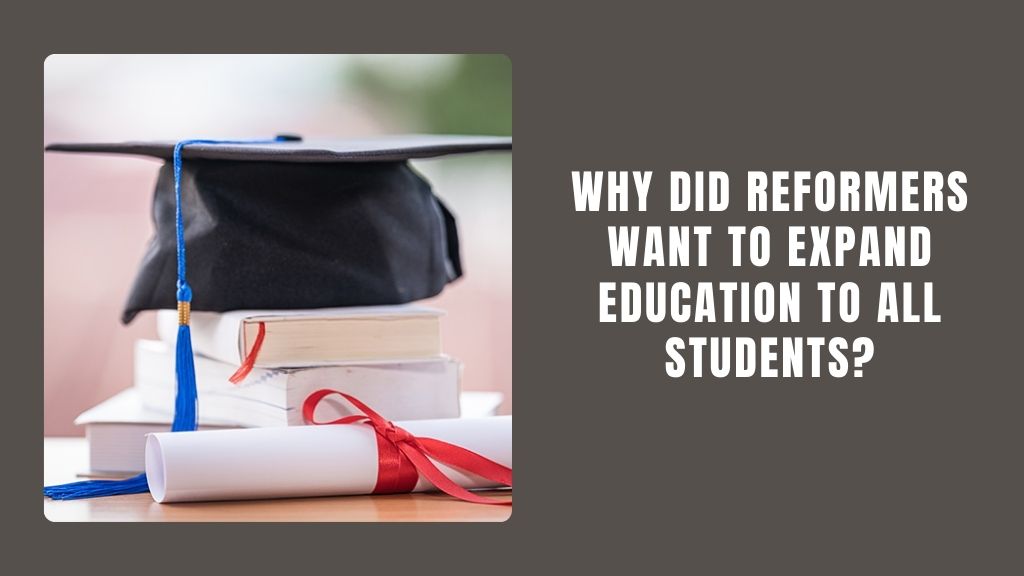Education is a fundamental right that helps individuals grow intellectually, socially, and economically. Throughout history, reformers have worked to make education accessible to all students, regardless of their background. But why did reformers want to expand education to all students? The answer lies in the belief that education is the key to progress, equality, and social development. By ensuring that every child has access to quality education, reformers aimed to create a more just and prosperous society.
This blog will explore the reasons behind the push for educational expansion, the benefits it brings, and how it continues to shape the modern world.
The Importance of Education in Society
Education is not just about learning facts and skills; it is about shaping individuals into informed and responsible citizens. It helps people develop critical thinking, problem-solving abilities, and social awareness. Reformers understood that an educated society is more likely to progress economically, socially, and politically.
Some key reasons why education is important include:
- Economic Growth – Education equips individuals with skills needed for better job opportunities and economic stability.
- Social Equality – Expanding education helps bridge gaps between different social and economic groups.
- Democratic Participation – Educated individuals are more likely to engage in civic activities and make informed decisions.
- Personal Development – Education encourages self-improvement, creativity, and lifelong learning.
Also read: Why is Intellectual Growth Emphasized in Academic Integrity?
Why Did Reformers Want to Expand Education to All Students?
1. Promoting Social Equality
One of the primary reasons reformers pushed for expanded education was to create equal opportunities for all individuals. In the past, education was often reserved for the wealthy and privileged. This created a divide between the rich and the poor, making it difficult for lower-income families to improve their living conditions.
By expanding education to all students, reformers sought to break the cycle of poverty and social inequality. When children from all backgrounds have access to quality education, they have a fair chance to succeed in life.
2. Strengthening the Economy
Education is directly linked to economic development. A well-educated workforce is essential for the growth of industries, businesses, and innovation. Reformers understood that by providing education to all students, they could create a stronger and more skilled workforce.
For example, countries that invest in education tend to have higher employment rates and better wages. Workers with education and training contribute to economic productivity and help improve the overall standard of living.
3. Encouraging Democratic Participation
A well-educated society is essential for a functioning democracy. People who are educated are more likely to vote, understand political issues, and participate in civic activities. Reformers believed that education could help citizens become more informed and engaged in shaping their communities and governments.
By expanding education to all students, reformers aimed to create a society where people could think independently, make informed decisions, and contribute positively to democracy.
4. Reducing Crime and Social Problems
Studies have shown that education helps reduce crime rates and social problems. Individuals who receive a good education are less likely to engage in criminal activities, substance abuse, or other negative behaviors. Reformers recognized that by providing education to all students, they could create safer and more stable communities.
Education also teaches values such as respect, responsibility, and empathy. These qualities help individuals make better choices and contribute positively to society.
5. Preparing Students for the Future
The world is constantly changing, and education is necessary to prepare students for future challenges. Reformers wanted to ensure that all students had the knowledge and skills needed to adapt to new technologies, industries, and global issues.
For example, in today’s digital age, computer literacy and problem-solving skills are essential. By expanding education, reformers aimed to equip students with the tools they need to succeed in an evolving world.
6. Empowering Women and Marginalized Groups
In many societies, women and marginalized communities were historically denied access to education. Reformers fought to change this by advocating for equal educational opportunities for all.
Expanding education to women and marginalized groups has numerous benefits, including:
- Economic Empowerment – Education helps women secure better jobs and financial independence.
- Health Improvements – Educated individuals make better health decisions for themselves and their families.
- Breaking Gender and Social Barriers – Education helps challenge stereotypes and promote equality in society.
7. Advancing Scientific and Technological Progress
Innovation and technological advancements rely on education. Reformers understood that by investing in education, societies could promote scientific discoveries, medical advancements, and technological growth.
For example, many of the world’s greatest inventions and medical breakthroughs have come from educated individuals who had access to quality learning resources. By expanding education, reformers ensured that future generations could continue making progress in various fields.
The Impact of Education Reform
The efforts of reformers to expand education have had lasting impacts on society. Some key outcomes include:
- Increased Literacy Rates – More people can read and write, leading to better job opportunities and economic growth.
- Improved Quality of Life – Access to education has helped reduce poverty and improve living standards worldwide.
- Greater Innovation – Education has contributed to advancements in science, technology, and medicine.
- Stronger Communities – Educated individuals contribute to social harmony and community development.
Challenges in Expanding Education
While education reform has made significant progress, there are still challenges that need to be addressed, such as:
- Access to Quality Education – Many students, especially in developing countries, still lack access to proper educational resources.
- Financial Barriers – High education costs can prevent students from continuing their studies.
- Teacher Shortages – There is a need for more trained teachers to provide quality education.
- Technology Gaps – Not all students have access to digital learning tools, creating inequalities in education.
How We Can Continue Supporting Education Reform
To ensure that education remains accessible to all students, society must continue to support educational reforms. Some ways to do this include:
- Investing in Schools – Governments and communities should fund schools to provide better facilities and resources.
- Providing Scholarships and Financial Aid – Making education affordable helps more students complete their studies.
- Encouraging Community Involvement – Parents, teachers, and community members should support educational initiatives.
- Embracing Technology in Learning – Digital tools and online resources can help bridge the gap in education access.
Also read: Why is an Undergraduate Education in Psychology So Helpful in a Number of Different Lines of Work?
Conclusion
So, why did reformers want to expand education to all students? Because education is the foundation of a strong and just society. It promotes social equality, strengthens the economy, prepares students for the future, and reduces crime. Reformers understood that by ensuring education for all, they were creating opportunities for individuals and communities to thrive.
The push for educational reform has brought many positive changes, but challenges still remain. To continue the progress, society must support policies and initiatives that make education accessible to everyone. By doing so, we can ensure that future generations receive the knowledge and skills they need to succeed and contribute to a better world.

